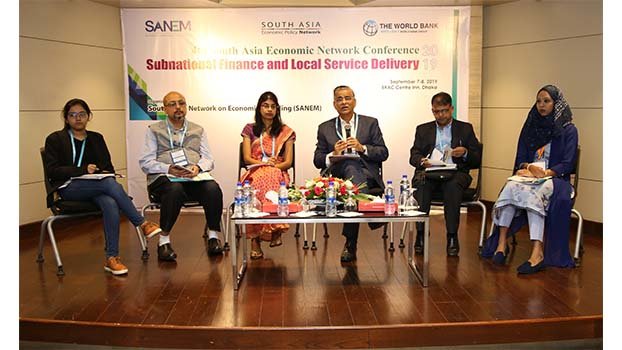Strengthening local govt bodies stressed for balanced dev

Speakers at a discussion underscored the need for strengthening the local government institutions under the constitutional mandate for attaining balanced development.
Due to absence of the support from the government, these institutions fail to generate resources and as a result, the revenues of these bodies are only 13 percent of their own resources.
Neither do they have the ability to generate resources, nor does the central government assists them. This tells us a lot about how we are treating our local government institutions.
The speakers made the remarks at a discussion on “Subnational Finance and Local Service Delivery” on the closing day of the two-day long the 4th South Asia Economic Network Conference at BRAC Centre Inn in Dhaka on Sunday.
South Asia Network on Economic Modelling (SANEM), South Asia Economic Policy Network and the World Bank jointly organised the event.
A conference on “The role of fiscal decentralization in improving education and health” was organised with Professor Shamsul Alam, Member (Senior Secretary), General Economics Division, Planning Commission in the chair. Three papers of the session were presented by Megha Rao, Indian Institute of Management, India, Mutawakkil Ahmad Abbasi, School of Public Policy, Pakistan Institute of Development Economics, Pakistan and Ashani Abayasekara, Institute for Policy Studies, Sri Lanka.
The discussants for the session respectively were, Dr. Manish Gupta, Assistant Professor, National Institute of Public Finance and Policy, New Delhi, India, Sunera Saba Khan, Research Economist, SANEM and Dr. Gopi K. Khanal, Joint Secretary, National Natural Resources and Fiscal Commission, Nepal.
Following the first session was a special lecture on “Bangladesh Local Government Public Financial Management Systems Assessment” by Dr. Ahsan H. Mansur, Executive Director, Policy Research Institute (PRI, Dhaka). This segment was chaired by Dr. Bazlul Haque Khondker, Chairman, SANEM and Professor of Economics, University of Dhaka.
Following the special lecture was the fifth session on “Social Networks and Local Service Delivery”, chaired by Dr. K.A.S. Murshid, Director General, Bangladesh Institute of Development Studies (BIDS). The two papers of the session were presented by Dr. Atonu Rabbani, Professor, Department of Economics, University of Dhaka and Saheli Bose from Jadavpur University, India. The discussants for the session respectively were Panchali Banerjee, PhD Scholar at Department of Economics, Jadavpur University, Kolkata, India and Dr. Ashikur Rahman, Senior Economist, Policy Research Institute (PRI), Dhaka, Bangladesh.
Dr. Atonu Rabbani presented his paper on “Why Contacts Matter: Local Governance and the Targeting of Social Pensions in Bangladesh”. Based on an extensive literature review, Kosack and Fung (2014) suggest that in many cases, public officials and other local decision makers may actually be willing to serve the poor, but lack the relevant knowledge to do so. Dr. Rabbani and his co-authors showed in the paper that in such situations, policy interventions focusing on monitoring and accountability can actually be counterproductive. It is thus important to fully understand the reasons of mistargeting to design the optimal remedies. “Information and how we receive information is crucial when it comes to social pensions”, he said. Later, Saheli Bose presented her paper on “Social networks and political participation: Does ‘neighbourhood effects’ influence the allocation of household public goods?”
Followed by lunch were the concluding remarks by Dr. Hans Timmer, Chief Economist for South Asia, World Bank, titled, “Lessons Learned and What It Means for the Relationship between Different Tiers of Government”. This segment was chaired by Dr. Selim Raihan, Executive Director, SANEM and Professor of Economics, University of Dhaka. “I want to point out that while indeed there is a pull towards decentralization and a need for decentralization in South Asia, there is also a growing trend towards centralization and a need towards centralization in all over the world. These two trends are incredibly consistent with each other”, said Dr. Timmer. He also said, “If we think about decentralization, it could quickly lead to separation and fragmentation, which would be very unproductive. And that is probably even worse.”
The concluding remarks were followed by a policy expert panel discussion on “Subnational Finance and Local Service Delivery in South Asia: Challenges, Lessons and Remedies”. The panellists for this segment were Dr. Israt Husain, Advisor to the Prime Minister of Pakistan, Dr. Isher Judge Ahluwalia, Chairperson, Indian Council for Research on International Economic Relations, Dr. Ahsan H. Mansur and Dr. Selim Raihan. The panel discussion was moderated by Dr. Hans Timmer. Dr. Mansur thinks the primary issue is how delivery of local services can be ensured on the grass root level with efficiency. “Another issue that needs to be taken into account in terms of local government institutions is their selection process of who gets the social safety benefit”, he said. “In my view there is no getting away in putting the elected people in charge under the vigilant kind of oversight of the community. In India, there are empowered mayors in only 5-6 states, and this situation needs to be changed”, said Dr. Ahluwalia.
“Higher education and vocational trainings should not be controlled by local governments, rather it should be under the domain of the federal government”, said Dr. Husain. Dr. Raihan said, “In the context of Bangladesh, which is not very different from India and Pakistan, the processes are really not based on rules, rather they are based on deals.” He also said, “What is very important to me is the empowerment of the local governments with the right capacity.”
The panel discussion was followed by the closing ceremony of the conference, conducted by Dr. Robert Beyer and Dr. Selim Raihan. This concluded the two days long conference.



